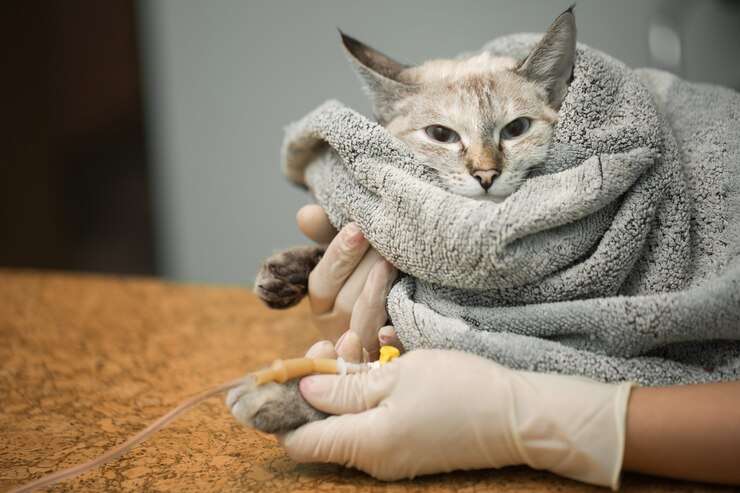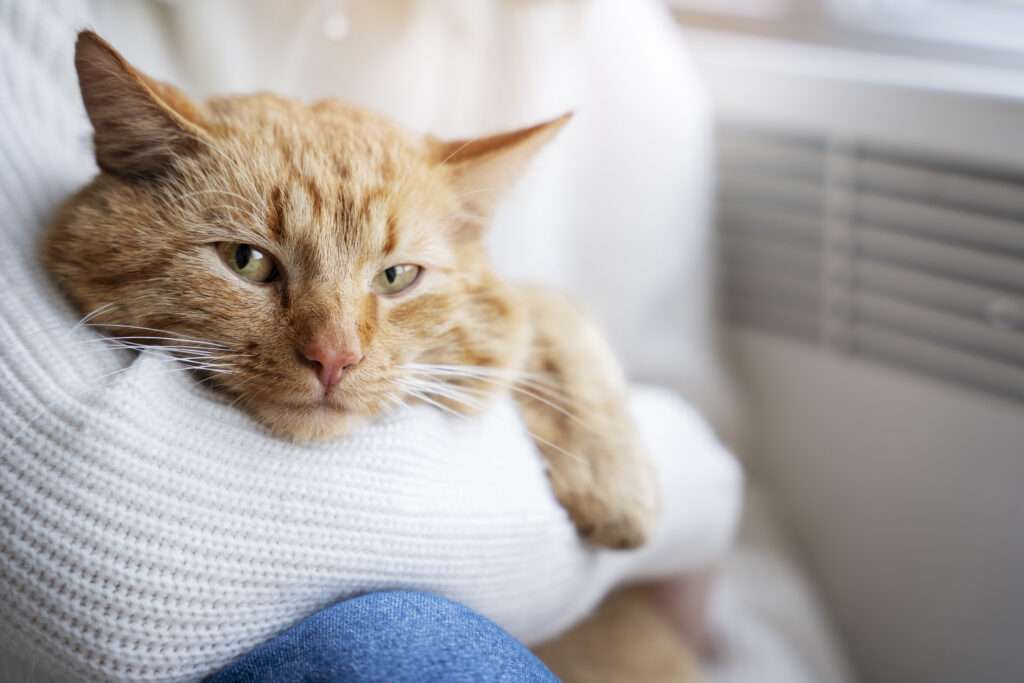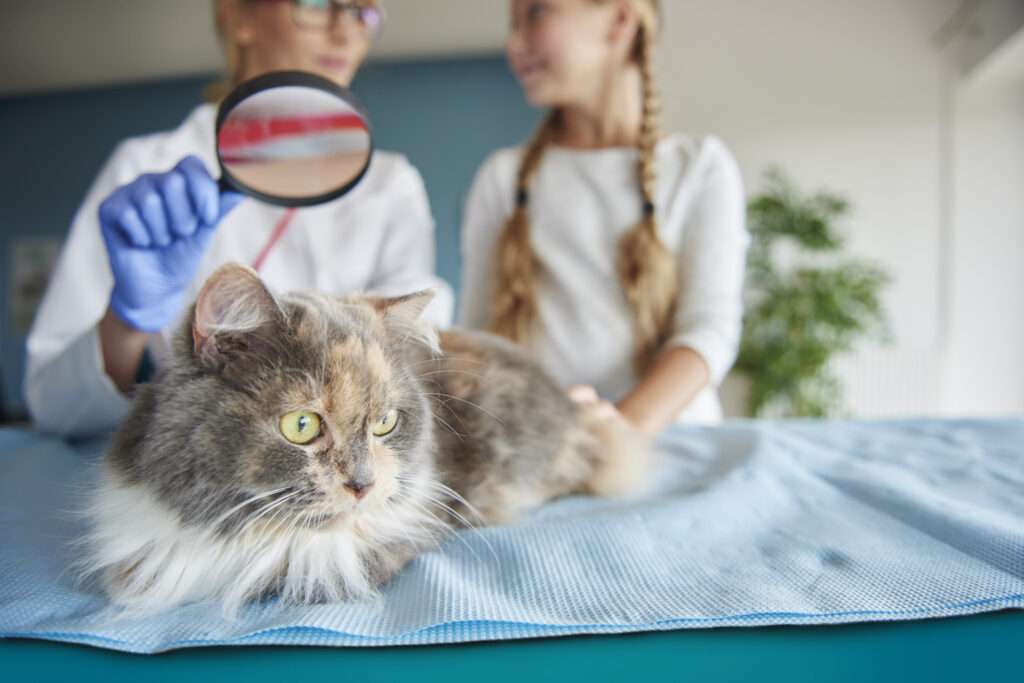Introduction

image credit: Freepik
“Can cats get colds?” This is a common question among cat owners, especially during the colder months or when their feline companions start exhibiting symptoms similar to the common cold in humans.
Yes, cats can get colds too. It’s not the kind of cold that humans get. They can catch infections from viruses, like feline herpesvirus and feline calicivirus, which spread easily among cats. These infections may cause sneezing, congestion, watery eyes and tiredness. To what we go through when we have a cold.
Understanding the signs of a cold in cats is crucial for providing proper care and ensuring a speedy recovery for your pet. In this article, we will talk more about how cats can get a cold.
Table of Contents
Let’s dive into this topic and learn more about it.
Can Cats Get Colds? Detailed Guide

image credit: Freepik
It’s a common concern among cat owners: can our beloved feline companions catch a cold, just like humans? As I mentioned above, yes. Cats can indeed experience symptoms akin to a cold, although they’re not caused by the same viruses that affect us.
Cats, on the other hand, are prone to getting respiratory infections, usually caused by viruses such as feline herpesvirus and feline calicivirus.
These infections can easily spread among cats. May result in issues like sneezing, stuffy nose, teary eyes and low energy—symptoms that bear a resemblance to a cold in people.
Recognizing the signs of a cold in cats is crucial to ensuring your furry companion receives care and recovers quickly. Although these infections are usually not life-threatening, they can cause discomfort. Might require attention in severe instances.
It’s important to keep an eye on your cat’s well-being and consult a professional if you observe any symptoms. By taking steps like maintaining a living environment for your cat and limiting their contact with sick felines, you can lower the chances of them getting a cold.
By providing care and timely treatment, you can help your cat get through sniffles and maintain their health and happiness all year round.
Interesting Topic: Can a Neutered Cat Get a Pregnant Female cat?
Typical Symptoms of a Cat Cold
So, how do you know if your cat has caught a cold? Look out for the following signs:
- Sneezing:
- Runny Nose:
- Red and Irritated Eyes:
- Congestion:
Identifying the signs of a cold in your feline friend is crucial to ensuring they receive care. Even though cats can’t communicate their discomfort verbally, they often display indicators when dealing with a cold.
Typical symptoms include sneezing, with nasal or ocular discharge. Additionally, you might observe labored or congested breathing in your cat due to nasal blockage. Watery eyes, increased tearing, lethargy and reduced appetite are also commonly seen during an episode.
Also, make sure to watch for any differences in your cat’s behavior, like hiding or being less playful. These changes might indicate that they’re not feeling well and could require care and attention.
Even though most colds in cats go away on their own over time, it’s important to keep an eye on your friend and seek advice from your vet if you notice any health concerns.
Taking action early and addressing symptoms promptly can aid in your cat’s recovery from their cold.
What to Do if My Cat Has a Cold?
There are some points you can follow;
- Comfort and Warmth:
- Hydration:
- Isolation:
- Steamy Sessions:
- Gentle Cleaning:
- Veterinary Consultation:
If you think your cat might be sick with a cold, there are things you can do to help them feel better and get faster.
The important thing is to create a warm space for your cat so they can relax and get better. Ensure they have water to drink to stay hydrated, and provide them with good food that can boost their immune system.
You can also assist in relieving your cat’s symptoms by cleaning any discharge from their nose or eyes using a cloth.
If your cat seems congested, you could consider using a humidifier or steam therapy to help loosen mucus and improve their breathing.
Moreover, you might want to think about giving your cat some treats or enticing food to motivate them to eat if they’ve lost their appetite.
When most cats catch a cold, it usually gets better on its own over time. However, it’s important to keep an eye on your cats and seek help from a cat’s doctor if their symptoms get worse or if they seem distressed.
Your vet can give you advice on treatments or medicines that might make your cat feel better and heal faster.
By giving your friend your care and attention, you can help them recover from their cold and get back to being their playful selves in no time.
Does My Cat Have Allergies or a Cold?

It can be quite tricky to differentiate between allergies and a cold in cats since they may show signs. Allergies in cats usually show up as sneezing, itching and skin problems, while a cold typically comes with symptoms such as sneezing, a stuffy nose and watery eyes.
Nevertheless, there are variations that can assist you in figuring out if your cat is dealing with allergies or a cold.
Cats with allergies may show symptoms at certain times of the year, possibly when pollen or other allergens are prevalent. In contrast, cats can catch colds year round through contact with cats or contaminated objects.
Allergic cats might also have skin issues such as redness, swelling or ear infections, while cats with colds mainly display symptoms.
If you’re not sure whether your cat is dealing with allergies or a cold, it’s an idea to seek advice from your vet for a diagnosis. They can conduct tests to determine the root cause of your cat’s symptoms and suggest treatment choices.
By collaborating with your veterinarian, you can assist your cat in alleviating their symptoms and leading a joyful, healthier life.
How Will I Know if My Cat Needs to See a Vet?
Deciding if your cat requires attention for its symptoms involves closely observing and assessing its overall well being. Although most cat colds tend to get better with time and proper care, there are indicators that suggest it might be necessary to consult a vet.
If your cat continues to show symptoms for a week or if the symptoms get worse, it’s best to speak with your vet.
Also, if your cat gets a fever, has trouble breathing or displays signs of dehydration like urination or being very tired, it’s important to get help from a vet.
Look out for warning signs that might suggest your cat needs a trip to the vet, such as nasal discharge, coughing or throwing up.
In the end, rely on your gut feelings. Lean towards caution regarding your cat’s well being. If you’re uncertain about whether your cat should visit the vet, it’s wise to seek guidance from a professional later.
Conclusion
In conclusion, can cats get colds? Many pet parents may wonder if cats can catch colds when they notice their companions showing signs of issues. While cats can indeed get colds, it’s crucial to know that the viruses causing their symptoms are different from those affecting humans.
By paying attention to symptoms of cats, offering them care at home, and consulting a vet when necessary, you can assist your pet in overcoming their illness and getting back to their playful selves. Always prioritize your cat’s health and well being. Don’t hesitate to contact your vet if you have any concerns about their well being. By providing care and love, you can ensure your cat leads a healthy life for years to come.
FAQs: Can Cats Get Colds?
1. How can I treat my cat’s cold at home?
You can treat your cat’s cold at home by providing them with a warm and comfortable environment, ensuring they stay hydrated, gently wiping away any discharge from their nose or eyes, and offering tempting food to stimulate their appetite.
2. How do I know if my cat has a cold?
You can determine if your cat is feeling under the weather by watching out for signs like sneezing, a stuffy nose, watery eyes, tiredness and a reduced appetite. If you notice these symptoms in your cat, it’s best to keep an eye on their health and seek advice from a vet for an assessment.
3. How do indoor cats get colds?
Indoor cats can still catch colds from other cats, as these viruses are highly contagious and can be spread through close contact or shared living spaces. Additionally, indoor cats may also be exposed to cold viruses through contaminated objects or surfaces.
4. Do cats get colds easily?
Cats can catch colds relatively easily, especially in environments where they are in close contact with other cats or exposed to viruses. However, the severity and frequency of colds can vary depending on factors such as age, overall health, and vaccination status.


